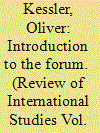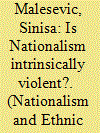| Srl | Item |
| 1 |
ID:
117840


|
|
|
|
|
| Publication |
2012.
|
| Summary/Abstract |
In the last couple of years, Critical Realism has established itself as an alone-standing intellectual movement in International Relations (IR). It not only seeks to challenge the idea of the middle ground on which most of the more moderate versions of constructivist thought base their convictions, but it also seeks to provide own answers to basic scientific problems around the relationship between facts and values, causation and causality, or agents and structure. If one would want to characterise Critical Realist positions, one has to point to their attempted resurrection of ontology. Taking inspiration, in particular, from Bhaskar's Possibility of Naturalism and subsequent works, different strands of Critical Realism are tied together in their conviction that epistemology has had too much influence on scientific debates ever since Kant changed the structure of philosophical reasoning by asking how objects were determined by concepts rather than the other way round. The prevalent focus on epistemological questions is not only biased and asks the wrong questions, but it starts from false premises in the first place, as Wight and Patomäki once put it: every theory of knowledge must also logically presuppose a theory of what the world is like (ontology) for knowledge (epistemology) to be possible.
|
|
|
|
|
|
|
|
|
|
|
|
|
|
|
|
| 2 |
ID:
127666


|
|
|
|
|
| Publication |
2013.
|
| Summary/Abstract |
This article analyzes the complex and contradictory relationships between nationalism and organized violence. The author challenges the approaches that see nationalism as being inherently linked with violence and demonstrates that nationalist ideology by itself is rarely a main cause of hostile acts. The article focuses on the different forms of organized violence including wars, revolutions, terrorism, and genocide. It aims to show that the relationship between violence and nationalism cannot be properly captured by the dominant intentionalist, naturalist, and formativist perspectives. Instead the case is made that the emphasis should be given to the long-term historical processes and the relative modernity of both nationalism and organized violence. The author argues that it is very difficult to generate sustained and organized violent nationalist action. The mutation of nationalist doctrines into violent acts is generally a product of unintended structural circumstances and is characterized by its temporary nature and volatility. More specifically, this process is usually generated by the coercive bureaucratization, centrifugal ideologization, and their capacity to be embedded in the networks of microsolidarity.
|
|
|
|
|
|
|
|
|
|
|
|
|
|
|
|